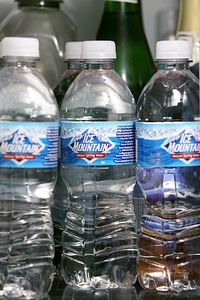from ESPN.com (of all places!)
TMQ -- Best If Read By Wednesday Morning: Recently, I was sitting at a boring staff meeting -- I mean, at a vital staff meeting -- and drinking bottled water. I looked at the cap, which was stamped BEST BY 11-14-09. Not best by 2009 or even November 2009, best by Nov. 14, 2009. What, exactly, would begin to happen inside this bottle on Nov. 15, 2009? Ever more products that ought to have a shelf life measured in decades if not centuries, such as water packaged in glass, are stamped with near-term expiration dates in hopes you'll throw them away and buy more. This isn't just a minor concern about bottled water and soda. Studies have shown that most over-the-counter and prescription drugs in solid pill form remain safe and potent for many years past the expiration date, yet people throw away expired pills and spend big money to replace them.

AP Photo/Charles Rex Arbogast
If water has an expiration date, and the universe is 14 billion years old, doesn't that mean all the water in the universe expired 13.999999 billion years ago?
Bottled water note 1: Check the PiMag Aqua Pour System from trendy appliances brand Nikken, which employs "an ingenious gravity flow system." When you open the spigot, gravity causes the water to flow down into your cup. Ingenious!
Bottled water note 2: Fiji water really comes from Fiji -- think of the fossil resources used to ship it. Charles Fishman reports in Fast Company magazine that last year Americans drank 28.3 gallons per capita of bottled water, versus 1.6 gallons per capita in 1976. The 2006 figure is an 18-fold increase in three decades, and it works out to 226 16-ounce water bottles per American per year. People buy bottled water in New York City, though its tap water, which comes from upstate reservoirs, tastes delicious and contains no contamination. Fishman pointed out that bottled water is even popular in San Francisco, though San Francisco tap water comes from Yosemite National Park and tastes really good. If San Francisco tap water were sold as Yosemite Water and cost too much, then people would want it!
The bottled water craze began in Europe, where civic water is not as pure as here and often "hard" -- in much of Europe, you're smart to drink bottled water or to use a Brita filter. In America, where most tap water is of high quality and good flavor, bottled water is in many uses just another frill; and it takes substantial amounts of petroleum to manufacture the plastic in the bottles, plus ship bulk water around the country. Imagine telling the 1 billion people worldwide who lack access to clean drinking water that Americans use clear, pure drinking-quality water to wash their cars, then drink from water bottles and throw the bottles away. That last is my feared real explanation for the bottled water craze -- we've become too lazy to fill a glass, drink and return the glass to the kitchen. We want to throw the bottle away.
Bottled water note 3: A recent spate of news accounts pointed out that two major brands are not spring water but, rather, tap water that has been through an extra purification cycle. After these reports, the International Bottled Water Association bought full-page ads in The New York Times and other major newspapers, extolling its member companies' products. This is another example of TMQ's Law of Corporate Scandals: Bad for Everyone But Newspapers. Whenever there is a corporate scandal, the involved party buys full-page newspaper ads to state its case. Here, the IBWA explains that hard-hitting annual facilities inspections are conducted by "an independent, highly qualified technical auditing and compliance firm" that, ahem, works on contract to the IBWA.